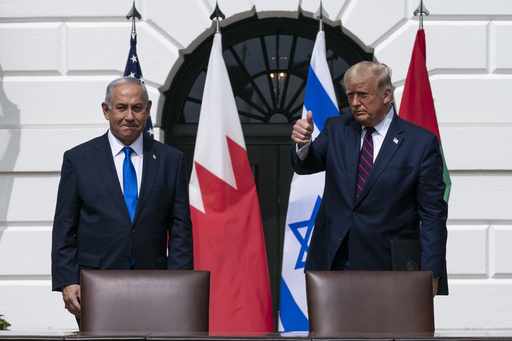
WASHINGTON — On Tuesday, President Donald Trump is scheduled to meet with Israeli Prime Minister Benjamin Netanyahu, who is currently navigating a complex situation with his right-wing coalition pushing for an end to a temporary ceasefire with Hamas militants in Gaza. At the same time, many Israelis are feeling the strain of the ongoing conflict and are urging for the safe return of hostages and a resolution to the 15-month-long war.
While Trump has previously asserted his influence in facilitating the recent hostage and ceasefire agreement, he remains skeptical about the sustainability of the truce. “I have no guarantees that the peace is going to hold,” he stated during a press conference. The discussions between the two leaders will likely include topics of mutual interest, such as the anticipated normalization deal between Israel and Saudi Arabia, as well as concerns regarding Iran’s nuclear ambitions. However, the primary focus will be advancing the second phase of the hostage agreement.
Netanyahu’s visit to Washington marks the first time a foreign leader has met with Trump since he reassumed his position, an event overshadowed by his declining popularity at home. The Israeli prime minister is currently embroiled in a corruption trial, facing allegations of exchanging favors with media figures and wealthy associates. He has labeled these charges as part of a “witch hunt.” His association with Trump, who retains strong support in Israel, could serve to redirect attention away from his legal troubles and improve his public image.
This trip is also significant as it is Netanyahu’s first journey outside Israel since the International Criminal Court issued arrest warrants last November, connected to accusations of crimes against humanity arising from the conflict in Gaza. Notably, the United States does not recognize the ICC’s jurisdiction over its citizens or territory.
Netanyahu met on Monday with Trump’s Mideast envoy, Steve Witkoff, to begin negotiations for the next steps in the ceasefire plan. After the meeting, he described the discussions with Witkoff and U.S. National Security Adviser Michael Waltz as “positive and friendly.” Continuing diplomatic efforts, Netanyahu confirmed that he would send a team to Qatar to engage in indirect negotiations with Hamas, mediated by the Gulf state, and he plans to convene his security Cabinet upon returning to Israel to review demands for the ongoing ceasefire.
However, Netanyahu faces immense pressure from hardline members of his coalition to abandon the ceasefire and resume military actions against Hamas. Bezalel Smotrich, a key ally of Netanyahu, has threatened to destabilize the government if hostilities are not resumed, a move that could precipitate early elections.
Hamas, which has regained control of Gaza since the cessation of hostilities many weeks ago, has expressed refusal to release any hostages in the next phase without a complete conclusion to the war and the withdrawal of Israeli troops. Conversely, Netanyahu asserts that Israel’s commitment remains to defeat Hamas and recover all hostages taken during the initial Oct. 7, 2023, attack.
Mira Resnick, who previously served as a deputy assistant secretary of state for Israeli and Palestinian matters, noted that Trump may not have the patience for Netanyahu’s political struggles if they obstruct broader objectives for his administration. “The president started his term by saying that he wanted the ceasefire to be in place by Jan. 20. That’s what he got,” Resnick commented. “He is invested in this because he was able to take credit for it.”
Einav Zangauker, a mother of one of the hostages, urged Trump to leverage American influence to ensure Netanyahu’s commitment to the agreement. Her son Matan, 24, is among those anticipated to be part of the second phase of the hostage deal, set to exchange living hostages for a notable number of Palestinian prisoners, alongside a full withdrawal of Israeli forces from Gaza.
“I want President Trump to know there are certain extreme elements within Israel attempting to undermine his objectives,” Zangauker stated, having traveled to Washington to participate in a scheduled rally outside the White House. “We represent the vast majority of Israel. The ultra-extremists are forcing the prime minister to act according to their demands.”
Since reassuming office, Trump has proposed relocating Palestinians from Gaza to Egypt and Jordan, a suggestion that has been outright rejected by both Egyptian and Jordanian leaders. Several Arab nations, including Saudi Arabia, the United Arab Emirates, Qatar, and the Palestinian Authority, have also dismissed these displacement initiatives.
Despite this, Trump maintains his belief that the substantial financial support provided by the U.S. to Egypt and Jordan might encourage these nations to accept displaced Palestinians. Some hard-right factions within Netanyahu’s government are in favor of moving Palestinians out of Gaza. Shibley Telhami, a noted expert on Middle Eastern affairs, stated that Trump’s proposition may serve Netanyahu’s agenda, but it contradicts their shared aim of achieving a Saudi normalization deal.
The Saudis, influential within the Arab world, have made clear that they won’t support a normalization agreement without a resolution to the ongoing conflict and a plausible path toward a Palestinian state. “This push by Trump doesn’t align with the concept of a Palestinian state as traditionally understood,” Telhami remarked. “It’s difficult to imagine the Saudis agreeing to such a plan.”
During their diplomatic engagements, Netanyahu also met with Trump’s nominee for the ambassador to Israel, former Arkansas Governor Mike Huckabee, who has consistently opposed the creation of a Palestinian state in territories previously occupied by Israel. Additionally, Netanyahu is expected to press for definitive action regarding Iran, highlighting recent setbacks the Iranian military has experienced due to Israeli operations in Gaza and Lebanon, which have significantly undermined threats from Hamas and Hezbollah. Netanyahu views this moment as an opportunity to advance measures against Iran’s nuclear advancements.
“This is one of the most significant meetings between an American president and an Israeli prime minister in recent history,” asserted Eytan Gilboa, a specialist in U.S.-Israel relations. “The implications of this gathering extend beyond the two nations, potentially reshaping the dynamics of the entire Middle East.”

